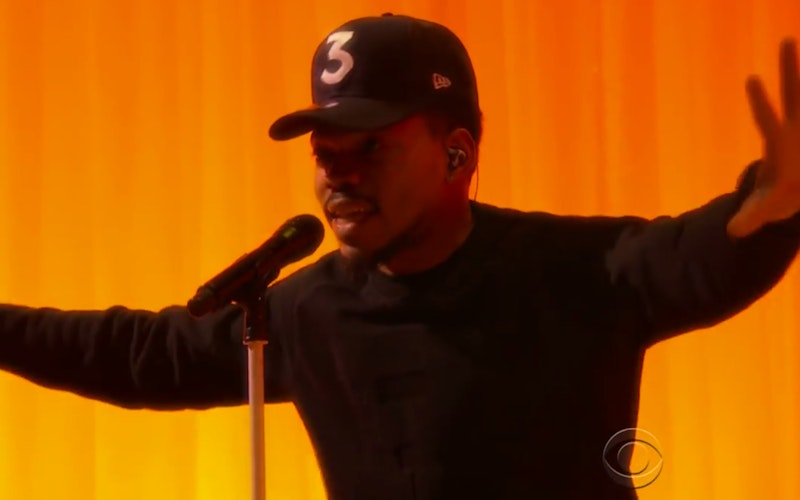
Music
The Biblical Hope of Chance the Rapper
What do we hope for? And how do we live in the meantime? It’s a pertinent question we all have to answer, and perhaps those who have social and cultural influence feel the weight of it to a greater degree than most of us. Based on his recent appearance on The Late Show with Stephen Colbert, Chance the Rapper struggles with those questions. He debuted an untitled song that lets us into his fame, his struggle, and his hope in a way that should resonate with Christians in particular.
In the first verse, the overall vibe is of a man overworked, stressed, and fatigued with himself and the world. Chance underscores his distance from God: “I get sad when I look at the stars / They so pretty you can’t tell ‘em apart / You think they close / But really they far / And really they ain’t even that much closer to God.” Distance from his family is also the (perhaps unintended) result of his fame. Expressing regret about his relationship with his toddler daughter, he laments the outcome of his work ethic, noting, “You hit a point where you can’t Uber back / The other day I told a hummingbird he too relaxed.” We get a real sense of the trajectory of the song in the chorus, which grows in its intensity and gospel-inflected overtones, as Chance and his backup singers croon, “The day is on its way / It couldn’t wait no more / Here it comes / Ready or not.”
The second verse imagines reconnection—with Chance’s family and his hometown of Chicago. But what stands out most, in contrast with his endless workaholism in the first verse, is his newfound complacency: “Sit my a-- / Send my tweet / Fold my arms / Twist my weed.” Kicked back in his recliner, his celebrity has produced an apathy that’s a dream he has to fight off with a wakeful vigilance.
In the final verse, Chance notes that he’s not alone in this apathy. “I’m just gonna keep rappin’ / And y’all just keep clappin’ and keep happenin’ / Like Flint got clean water / And y'all don't got teen daughters and black friends and gay cousins / Y’all just don’t say nothin’.” Then we get the clear allusion to King Jesus, bringing biblical reparations with him: “Know that the day comin’ / Knees bow, tongues confessing / The last ones gettin’ first dibs on blessings.” This is followed by a final curse—“The American dream / May you never wake up”—before Chance and guitarist/singer Daniel Caesar launch into a final crescendo of the song’s refrain, affirming once again that the Day is coming and, in fact, is at hand.
What do we hope for? And how do we live in the meantime?
What Chance describes here is our struggle to maintain a properly biblical hope. On the one hand, Christians can rightly sense the urgent call to action and justice in our world. Especially for those of us raised in that strand of American evangelicalism that focuses almost solely on salvation in the next life, the reality that God’s kingdom is already active, present, and powerful can be invigorating. Yet there’s a risk of placing so much on ourselves in the present age that, like Chance, we work tirelessly and endlessly. That kind of restless work can be a sign that we believe God is functionally absent from our lives and our world. We’re working, yes, but in a way that sees God as far off and dependent on us. That’s an exhausting way to live.
But the pendulum can easily swing back the other way, into a kind of complacent and cynical attitude that abandons the world for the comfort of an easy chair. This sloth is not primarily a physical laziness but “acedia,” the spiritual vice whose main characteristic, according to Rebecca Konyndyk DeYoung, is that we become lazy about the demands of love—toward God and toward our neighbor. So Chance’s second verse could be seen as a gloss of DeYoung’s explanation of sloth as something that is shown “in the total inertia of the couch potato or the restless distractions of endless activity.”
So how do we avoid the mirror errors of doing nothing or trying to do everything? One answer historically given by Christians is ora et labora. Pray and work. I hear Chance echoing this in two ways. First, the constant refrain is a reminder that the Day (of the Lord) is coming whether we’re ready or not. It’s not on us; it’s on God. Our sin and brokenness runs so deep that ultimately only he can set it right. So we pray. Second, we work or, as Chance puts it, “I’m just gonna keep rappin’.” He works. He proclaims. He does what he does, neither taking too much on himself nor complacently sitting back.
In this way, Chance does what the prophet does: points to the reality of divine judgment and hope. If we have the ears to hear, we should do likewise, going about the business of bearing witness to God’s kingdom with neither pride nor despair, but prayerful commitment and hope that the Day is on the way.
Topics: Music, Culture At Large, Arts & Leisure